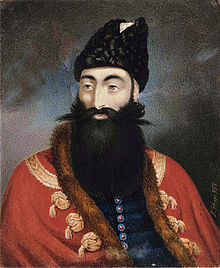
Back عباس ميرزا Arabic ولى العهد عباس ميرزا ARZ Abbas Mirzə Azerbaijani عباس میرزا AZB Abbas Mirza Catalan عەباس میرزا CKB Abbás Mírzá Czech Abbas Mirza German Αμπάς Μιρζά Greek Abbas Mirza Spanish
| Abbas Mirza عباس میرزا | |
|---|---|
 Portrait of Abbas Mirza, signed by L. Herr, dated 1833 | |
| Crown prince of Iran | |
| Tenure | 20 March 1799 – 25 October 1833 |
| Predecessor | Fath-Ali Shah Qajar |
| Successor | Mohammad Shah Qajar |
| Born | 26 August 1789 Nava, Mazandaran, Qajar Iran |
| Died | 25 October 1833 (aged 44) Mashhad, Khorasan, Qajar Iran |
| Burial | |
| Spouse | Galin Khanum |
| Issue | Many, among them: Mohammad Shah Qajar Khanlar Mirza Bahram Mirza Bahman Mirza Farhad Mirza |
| Dynasty | Qajar |
| Father | Fath-Ali Shah Qajar |
| Mother | Asiya Khanom Devellu |
| Religion | Twelver Shia Islam |
Abbas Mirza (Persian: عباس میرزا; 26 August 1789 – 25 October 1833) was the Qajar crown prince of Iran during the reign of his father Fath-Ali Shah Qajar (r. 1797–1834). As governor of the vulnerable Azerbaijan province, he played a crucial part in the two wars against the Russian Empire (1804–1813 and 1826–1828), as well as the war of 1821–1823 against the Ottoman Empire. He is also recognized for leading Iran's first reform and modernization attempts with the help of his ministers Mirza Bozorg Qa'em-Maqam and Abol-Qasem Qa'em-Maqam.
The conflict in the Azerbaijan and Caucasus regions between Iran and the Russian Empire was prevalent throughout the time that Abbas Mirza was growing up. On March 20, 1799, he was made the crown prince and given the title of Nayeb-al-saltana (viceregent). Around the same time, he was appointed the governor of Azerbaijan, with Soleyman Khan Qajar and Mirza Bozorg Qa'em-Maqam as his adjutants. Following Russia's takeover of Ganja in 1804, Abbas Mirza was in command of the Iranian military counterattack during the first and second Russo-Iranian wars. Throughout the two wars, he fought against numerous Russian commanders in various engagements, scoring both victories and defeats. The Iranians ultimately lost both wars, agreeing to sign the treaties of Gulistan and Turkmenchay, in which they ceded all of their holdings in the Caucasus, corresponding to present-day Armenia, Republic of Azerbaijan, and Dagestan.
In 1821, during interlude between the first and second Russo-Iranian war, increased Iranian-Ottoman tensions led to a new war. Abbas Mirza and his elder brother and rival Mohammad-Ali Mirza Dowlatshah made a joint assault on the Ottoman Empire, the latter penetrating into Ottoman Iraq as far as the walls of Baghdad. Peace was made in 1823, in which both parties signed the Treaty of Erzurum that recognized the previous borders established by the Treaty of Zuhab in 1639.
In an effort to make up for his losses by winning over less powerful foes and bolster his claim to the throne, Abbas Mirza invaded the areas east and northeast of Mashhad in the summer and fall of 1832, taking control of Khabushan, Sarakhs, and Torbat-e Heydarieh. Under continuous medical care by both Western and Iranian physicians, Abbas Mirza ultimately died of illness on 25 October 1833 in Mashhad. Fath-Ali Shah died the following year, being succeeded by Abbas Mirza's son Mohammad Mirza, who assumed the regnal name of Mohammad Shah Qajar (r. 1834–1848).